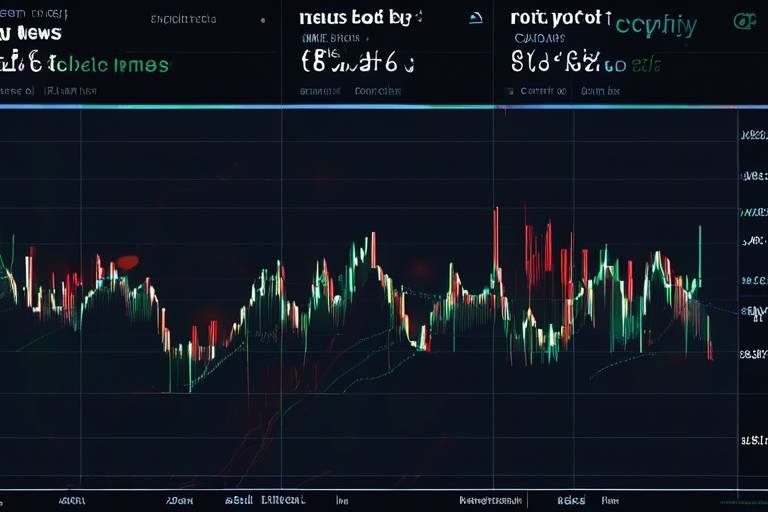Evaluating the Performance of Privacy Coins in 2025
The world of cryptocurrencies is evolving at a breakneck pace, and by 2025, privacy coins are expected to play an even more significant role in the digital currency landscape. As we delve into the anticipated developments and performance metrics of these coins, it’s essential to understand not only their technological underpinnings but also the market dynamics and regulatory challenges they face. Privacy coins, which prioritize user anonymity and transaction confidentiality, have gained traction among users who value their financial privacy. In this article, we will explore how these coins are poised to perform in the coming years, examining everything from technological innovations to market trends and regulatory frameworks.
As of 2023, the market for privacy coins includes several notable players, each with unique features that set them apart. Coins like Monero, Zcash, and Dash have carved out distinct niches within the cryptocurrency ecosystem. Monero, for instance, utilizes ring signatures and stealth addresses to obscure transaction details, making it a favorite among users who prioritize anonymity. Zcash, on the other hand, offers optional privacy features through its zk-SNARKs technology, allowing users to choose between transparent and shielded transactions. These features not only cater to individual privacy needs but also attract users who are wary of surveillance and data breaches.
The popularity of privacy coins can be attributed to several factors:
- Increased Awareness: As more individuals become aware of data privacy issues, the demand for privacy-focused cryptocurrencies has surged.
- Technological Maturity: Advances in blockchain technology have made privacy coins more accessible and easier to use.
- Market Volatility: During times of market instability, users often turn to privacy coins as a safe haven for their assets.
Looking ahead to 2025, technological innovations will play a crucial role in the performance of privacy coins. One of the most exciting developments is the advancement of cryptographic techniques that enhance privacy and security. These innovations are not just about keeping transactions private; they are also about making the entire cryptocurrency experience more user-friendly and scalable. For instance, improvements in scalability solutions will allow privacy coins to handle a larger volume of transactions without compromising speed or efficiency.
Among the most promising advancements is zero-knowledge proofs, a technology that allows one party to prove to another that they know a value without revealing the value itself. This technique is pivotal for enhancing transaction privacy. Imagine being able to confirm that you have enough funds for a transaction without disclosing your entire balance. This not only enhances user privacy but also builds trust within the network.
However, implementing zero-knowledge proofs in real-world applications is not without its challenges. Developers face hurdles such as computational complexity and the need for robust infrastructure to support these advanced cryptographic methods. Addressing these challenges will require collaboration within the developer community and ongoing innovation to streamline the process.
Beyond privacy coins, the potential applications of zero-knowledge proofs are vast. They could revolutionize various sectors, including identity verification and secure voting systems, paving the way for a more private and secure digital landscape. As these technologies mature, we can expect to see broader adoption across various blockchain applications.
Another critical issue facing privacy coins is the balance between decentralization and privacy. While decentralization is a foundational principle of cryptocurrencies, privacy coins must ensure that their privacy features do not compromise network integrity. Developers are actively working to create solutions that maintain this balance, thereby fostering user trust and encouraging wider adoption.
As we approach 2025, understanding market trends and adoption rates is vital for evaluating the performance of privacy coins. User adoption is on the rise, driven by a growing awareness of the importance of financial privacy. Trading volumes have also seen significant increases, with institutional investors beginning to recognize the value of privacy coins as a hedge against market volatility.
However, the future of privacy coins is not solely dependent on market forces; regulatory frameworks will play a crucial role as well. Different jurisdictions are taking varied approaches to regulating cryptocurrencies, particularly privacy coins. Some countries may embrace them, while others may impose strict regulations or outright bans. This regulatory landscape will undoubtedly shape the acceptance and performance of privacy coins in mainstream finance.
When comparing privacy coins to traditional cryptocurrencies like Bitcoin and Ethereum, it becomes clear that each has its advantages and disadvantages. Privacy coins excel in providing anonymity and security, making them appealing to users concerned about surveillance. However, traditional cryptocurrencies often enjoy greater market acceptance and liquidity. The key for privacy coins will be to enhance their usability while maintaining their core privacy features.
- What are privacy coins? Privacy coins are cryptocurrencies designed to provide enhanced privacy and anonymity for users, often using advanced cryptographic techniques.
- How do zero-knowledge proofs work? Zero-knowledge proofs allow one party to prove knowledge of a value without revealing the value itself, enhancing transaction privacy.
- Are privacy coins legal? The legality of privacy coins varies by jurisdiction, with some countries embracing them and others imposing restrictions.
- What is the future of privacy coins? The future of privacy coins looks promising, with expected advancements in technology and increasing user adoption, although regulatory challenges remain.

Current Landscape of Privacy Coins
As we step into 2025, the landscape of privacy coins has evolved significantly from its inception. Privacy coins like Monero, Zcash, and Dash have carved a niche for themselves in the cryptocurrency market, primarily due to their unique features that prioritize user anonymity and transaction confidentiality. These coins utilize sophisticated cryptographic techniques to obscure transaction details, making it challenging for third parties to trace the flow of funds. This has driven their popularity among users who value financial privacy, especially in an era where data breaches and surveillance are rampant.
In 2023, the market saw a surge in the adoption of privacy coins, fueled by growing concerns over data security and personal privacy. The increasing number of users seeking to shield their financial activities from prying eyes has led to a remarkable rise in trading volumes. According to recent data, the market capitalization of privacy coins has grown by over 150% in the last two years, indicating a robust interest in these digital assets. The following table illustrates the market positions of some of the leading privacy coins as of 2023:
| Privacy Coin | Market Capitalization (USD) | Unique Feature |
|---|---|---|
| Monero (XMR) | $3.5 Billion | Ring signatures for enhanced anonymity |
| Zcash (ZEC) | $1.2 Billion | Zero-knowledge proofs (zk-SNARKs) |
| Dash (DASH) | $500 Million | InstantSend and PrivateSend features |
What’s particularly interesting is that the appeal of privacy coins extends beyond just individual users. Institutional investors are beginning to recognize the potential of these assets as a hedge against regulatory crackdowns on traditional cryptocurrencies. This shift in perception could significantly alter the investment landscape, paving the way for broader acceptance and integration of privacy coins into mainstream finance.
However, the road to widespread adoption is not without its challenges. Regulatory scrutiny remains a significant barrier. Governments around the world are grappling with how to handle privacy coins, often viewing them with suspicion due to their potential for facilitating illicit activities. As a result, some exchanges have delisted privacy coins, creating a ripple effect that impacts liquidity and market accessibility. Nevertheless, the community surrounding these coins is actively working to address these concerns, advocating for transparent practices and compliance with regulatory frameworks.
In conclusion, the current landscape of privacy coins is a dynamic and rapidly evolving one. With advancements in technology, increasing user demand for privacy, and a growing interest from institutional investors, the future looks promising. However, navigating the regulatory environment will be crucial for these coins to maintain their momentum and secure their place in the cryptocurrency ecosystem.

Technological Innovations
The landscape of privacy coins is continuously evolving, driven by groundbreaking that enhance their functionality and appeal. As we look towards 2025, several key advancements are poised to reshape the way these cryptocurrencies operate, making them not only more secure but also more user-friendly. One of the most exciting areas of development is in the realm of cryptographic techniques, which are the backbone of privacy coins. Innovations such as homomorphic encryption and ring signatures are paving the way for more robust privacy features, allowing users to transact without revealing their identities or transaction details.
Moreover, scalability solutions are becoming increasingly important. As the number of users and transactions grows, privacy coins must ensure that their networks can handle the load without compromising speed or security. Technologies like sharding and layer 2 solutions are being explored to address these challenges. By distributing the workload across multiple nodes or layers, privacy coins can achieve greater efficiency, ensuring that transactions are processed quickly while maintaining the highest levels of privacy.
One of the standout innovations in the privacy coin space is the implementation of zero-knowledge proofs (ZKPs). This cryptographic method allows one party to prove to another that a statement is true without revealing any additional information. For instance, a user can prove they have sufficient funds for a transaction without disclosing their account balance. This technology is not only crucial for enhancing transaction privacy but also for building user trust in the system. As advancements in ZKP technology continue, we can expect to see even more sophisticated applications that further bolster privacy and security in transactions.
However, the path to widespread implementation of zero-knowledge proofs is not without its hurdles. Developers face significant challenges in integrating these proofs into existing systems, particularly concerning computational efficiency and user experience. For instance, ZKPs can be computationally intensive, leading to longer transaction times if not optimized properly. The community is actively working on solutions, such as developing more efficient algorithms and leveraging advanced hardware, to overcome these barriers. As these challenges are addressed, we can anticipate a smoother integration of ZKPs into privacy coins, enhancing their utility and appeal.
Looking ahead, the potential applications of zero-knowledge proofs extend far beyond privacy coins. These proofs could revolutionize various sectors, including finance, healthcare, and identity verification, by providing a means to verify information without exposing sensitive data. Imagine a world where you can prove your age or creditworthiness without revealing your birth date or credit score. The implications are vast and could lead to a more secure and privacy-centric digital ecosystem.
Another critical aspect of technological innovation in privacy coins is the ongoing debate between decentralization and privacy. While decentralization is a core principle of cryptocurrencies, privacy coins must navigate the delicate balance of maintaining this decentralization while ensuring user privacy. Some projects are exploring hybrid models that combine centralized and decentralized elements to enhance privacy without sacrificing security. This balance is essential for building user trust and ensuring the long-term viability of privacy coins in the ever-evolving cryptocurrency landscape.

Zero-Knowledge Proofs
Zero-knowledge proofs (ZKPs) are revolutionizing the way we think about privacy in the digital age. Imagine being able to prove you know a secret without actually revealing the secret itself. It's like showing someone your ID without disclosing your age or address. This technology is at the heart of many privacy coins, enabling users to transact with enhanced confidentiality while ensuring the integrity of the transaction. As we look toward 2025, the implications of ZKPs are becoming increasingly significant, especially as they continue to evolve and improve.
At their core, zero-knowledge proofs allow one party (the prover) to convince another party (the verifier) that a statement is true without revealing any information beyond the validity of the statement itself. This is particularly crucial in the realm of cryptocurrencies, where transparency is often at odds with the need for privacy. With ZKPs, users can conduct transactions that are both private and verifiable, ensuring that their financial activities remain confidential while still adhering to the necessary security protocols.
One of the most exciting advancements in ZKPs is the development of zk-SNARKs (Zero-Knowledge Succinct Non-Interactive Arguments of Knowledge). These allow for extremely efficient proofs that can be verified quickly, making them ideal for blockchain applications. The efficiency and effectiveness of zk-SNARKs mean that privacy coins can offer enhanced scalability and speed, addressing one of the significant challenges faced by cryptocurrencies today. For instance, while traditional transactions can be slow and cumbersome, those utilizing zk-SNARKs can process information almost instantaneously, thereby improving the overall user experience.
However, implementing zero-knowledge proofs is not without its challenges. Developers face several hurdles, including:
- Complexity: The mathematics behind ZKPs can be intricate, making it challenging for developers to implement them effectively.
- Integration: Integrating ZKPs into existing blockchain frameworks requires significant adjustments and can lead to unforeseen complications.
- Community Understanding: Educating users and stakeholders about how ZKPs function and their benefits is essential for widespread adoption.
Despite these challenges, the community is actively working on solutions. Innovations in educational resources, developer tools, and collaborative projects are paving the way for smoother implementation of ZKPs in the future. As more developers become familiar with this technology, we can expect to see a surge in privacy-focused applications that leverage ZKPs, not just in privacy coins but across the broader blockchain landscape.
Looking ahead, the future applications of zero-knowledge proofs extend beyond just privacy coins. They hold the potential to transform various sectors, from secure voting systems to private transactions in supply chain management. By ensuring that sensitive information remains confidential while still allowing for verification, ZKPs could become a cornerstone of trust in digital interactions.
In conclusion, zero-knowledge proofs represent a fascinating intersection of technology and privacy. As we approach 2025, the advancements in this area will likely shape the trajectory of privacy coins and their acceptance in the broader cryptocurrency market. The balance between privacy and transparency is delicate, but with innovations like ZKPs, it is becoming increasingly achievable.
What are zero-knowledge proofs?
Zero-knowledge proofs are cryptographic methods that allow one party to prove knowledge of a fact to another party without revealing the fact itself.
How do zero-knowledge proofs enhance privacy in cryptocurrencies?
They enable transactions to be verified without disclosing sensitive information, thus maintaining user privacy while ensuring transaction integrity.
What are zk-SNARKs?
zk-SNARKs are a specific type of zero-knowledge proof that allows for quick and efficient verification of transactions without revealing any underlying data.
What challenges do developers face when implementing zero-knowledge proofs?
Developers encounter challenges such as the complexity of the mathematics involved, the need for integration into existing systems, and the necessity of educating users.
What are the future applications of zero-knowledge proofs?
Beyond privacy coins, ZKPs could be used in various fields, including secure voting systems, private transactions in supply chains, and more.

Implementation Challenges
Implementing zero-knowledge proofs (ZKPs) in privacy coins isn't as simple as flipping a switch; it's more like piecing together a complex puzzle. While ZKPs offer remarkable benefits in enhancing transaction privacy and security, several challenges hinder their widespread adoption. One of the primary hurdles is the computational complexity associated with ZKPs. These cryptographic techniques require significant processing power, which can slow down transaction speeds and increase costs for users. Imagine trying to run a high-performance race car on a narrow, winding road; the potential is there, but the path needs to be optimized.
Moreover, the implementation of ZKPs can create interoperability issues with existing blockchain protocols. Privacy coins must ensure that their systems can communicate effectively with other cryptocurrencies and platforms, which requires a delicate balance of maintaining privacy while facilitating broader network interactions. This is akin to trying to make a secret recipe that still needs to be shared at a potluck dinner—how do you keep your special ingredients under wraps while still contributing to the feast?
Another challenge lies in the community and developer support. While the technology is promising, it requires a robust ecosystem of developers who are well-versed in cryptography and blockchain technology. The community must also be willing to embrace these innovations, which can be a tough sell, especially for users accustomed to traditional privacy measures. Developers face the daunting task of educating the community about the benefits and functionalities of ZKPs, ensuring that users feel confident in adopting these new technologies.
Furthermore, the regulatory landscape poses a significant challenge. As governments around the world grapple with how to regulate cryptocurrencies, privacy coins often find themselves under intense scrutiny. Regulators may view the anonymity features of privacy coins as potential tools for illicit activities, leading to strict regulations that could stifle innovation. For instance, if a country decides to ban privacy coins outright, it could create a ripple effect, discouraging development and investment in this space.
To address these challenges, developers and the community are exploring various strategies. For instance, some projects are focusing on optimizing ZKP algorithms to reduce computational overhead and improve transaction speeds. Others are advocating for open-source collaboration, allowing developers from different backgrounds to contribute to the codebase and share insights. By fostering a collaborative environment, the community can leverage diverse expertise to overcome hurdles and push the technology forward.
In summary, while the implementation of zero-knowledge proofs in privacy coins presents numerous challenges, these obstacles are not insurmountable. With ongoing innovation, community support, and a proactive approach to regulatory issues, the future of privacy coins could be as bright as their promise suggests. The journey may be fraught with difficulties, but the potential rewards for enhanced privacy and security make it a path worth exploring.
- What are zero-knowledge proofs? Zero-knowledge proofs are cryptographic methods that allow one party to prove to another that a statement is true without revealing any information beyond the validity of the statement itself.
- Why are privacy coins important? Privacy coins provide users with enhanced anonymity and security in their transactions, making them an attractive option for those who value financial privacy.
- What challenges do privacy coins face? Privacy coins face challenges such as computational complexity, interoperability issues, community support, and regulatory scrutiny.
- How can these challenges be addressed? Developers can optimize algorithms, promote open-source collaboration, and engage with regulators to create a more favorable environment for privacy coins.

Future Prospects
As we gaze into the crystal ball of cryptocurrency, the future prospects of privacy coins look both exciting and complex. With the rapid evolution of technology and the increasing demand for privacy in digital transactions, these coins are poised to play a pivotal role in the cryptocurrency ecosystem. Imagine a world where your financial activities are as private as a whispered secret—this is the vision that privacy coins aim to realize. The advancements in cryptographic techniques, particularly in zero-knowledge proofs, could revolutionize how we perceive transaction privacy and security.
Moreover, the potential applications of zero-knowledge proofs extend far beyond just privacy coins. These innovations can be integrated into various sectors, including finance, healthcare, and even voting systems, ensuring that sensitive information remains confidential while allowing for verification. This versatility is a significant factor that could drive the adoption of privacy coins in the coming years. With more developers recognizing the importance of privacy, we may see an influx of projects that prioritize these features, leading to a more robust and diverse market.
However, it’s essential to consider the challenges that lie ahead. As privacy coins gain traction, they will inevitably attract the attention of regulators. The balance between ensuring user privacy and complying with regulatory requirements will be a tightrope walk for developers. The future may see privacy coins adapting their technologies to meet these regulations without compromising their core principles. This adaptability will be crucial in determining their long-term viability and acceptance in mainstream finance.
Furthermore, as institutional investors begin to explore the potential of privacy coins, we might witness a shift in market dynamics. These investors are often looking for assets that not only offer growth potential but also align with their values, such as security and privacy. The entry of institutional players could lend legitimacy to privacy coins, enhancing their appeal to the average investor. However, this also raises questions about the centralization of power within these networks, which could undermine the very essence of decentralization that many crypto enthusiasts cherish.
In summary, the future of privacy coins is filled with promise and uncertainty. Their ability to adapt to technological advancements, regulatory landscapes, and market demands will be crucial in shaping their role in the cryptocurrency space. As we move closer to 2025, it will be fascinating to watch how these factors interplay and influence the evolution of privacy-centric cryptocurrencies.
- What are privacy coins? Privacy coins are cryptocurrencies that enhance transaction privacy by obscuring the details of transactions, such as the sender, receiver, and amount.
- How do zero-knowledge proofs work? Zero-knowledge proofs allow one party to prove to another that a statement is true without revealing any information beyond the validity of the statement itself.
- Are privacy coins legal? The legality of privacy coins varies by jurisdiction, and it's essential to stay informed about local regulations.
- Can privacy coins be used for illegal activities? While privacy coins can provide anonymity, they are not inherently illegal; their use depends on the intentions of the users.
- What is the future of privacy coins? The future of privacy coins will likely be shaped by technological advancements, regulatory developments, and market dynamics.

Decentralization vs. Privacy
In the ever-evolving world of cryptocurrencies, the tension between decentralization and privacy is a hot topic that sparks intense debate among enthusiasts and developers alike. At its core, decentralization is about distributing power away from a central authority, fostering a network where no single entity has control. On the other hand, privacy coins strive to ensure that users can conduct transactions without revealing their identities or transaction histories. But how do these two principles coexist in a digital landscape that often demands transparency?
To understand this dynamic, we must first recognize that decentralization is a fundamental pillar of blockchain technology. It promotes trust among users by eliminating the need for intermediaries, which can often lead to inefficiencies and potential abuses of power. However, as the cryptocurrency market matures, the need for privacy has become more pronounced. Users are increasingly concerned about their financial data being exposed, leading to a growing demand for privacy-focused solutions.
This brings us to the crux of the issue: can a network be both decentralized and private? Many privacy coins, such as Monero and Zcash, have made significant strides in this area. They utilize advanced cryptographic techniques to obscure transaction details while maintaining a decentralized structure. For instance, Monero employs ring signatures and stealth addresses to ensure that transactions are untraceable, while still operating on a decentralized network of nodes.
However, the implementation of privacy features can create challenges. While users may desire anonymity, regulators are increasingly scrutinizing privacy coins, fearing their potential use in illegal activities. This has led to a paradox: in order to gain wider acceptance and avoid regulatory backlash, some privacy coins may need to compromise on their privacy features. This could lead to a slippery slope where the very essence of what makes these coins appealing is eroded.
Moreover, the balance between decentralization and privacy can influence user trust. If a privacy coin is perceived as being too centralized or if its privacy features are compromised for compliance, users may flock to alternatives that better align with their values. This creates a competitive landscape where privacy coins must continuously innovate to maintain their user base while navigating the regulatory environment.
Looking ahead, the future of privacy coins in relation to decentralization is uncertain. As technology advances, new solutions may emerge that allow for enhanced privacy without sacrificing decentralization. The integration of zero-knowledge proofs could be a game-changer, offering a way to validate transactions without revealing sensitive information. This could pave the way for a new era where privacy and decentralization coexist harmoniously.
In conclusion, the relationship between decentralization and privacy in the cryptocurrency space is complex and multifaceted. It requires a delicate balance where developers, users, and regulators must work together to foster an environment that respects both principles. As we move towards 2025, the evolution of privacy coins will likely reflect this ongoing struggle, shaping the future of digital finance in profound ways.
- What are privacy coins? Privacy coins are cryptocurrencies that focus on providing enhanced privacy features, allowing users to conduct transactions anonymously.
- How do privacy coins maintain decentralization? Privacy coins utilize decentralized networks of nodes to process transactions, ensuring that no single entity controls the network.
- What are the risks associated with privacy coins? Privacy coins may face regulatory scrutiny, and their use in illegal activities can lead to a negative perception and potential restrictions.
- Can privacy and transparency coexist in cryptocurrencies? While challenging, advancements in technology, such as zero-knowledge proofs, may enable solutions that provide both privacy and necessary transparency.

Market Trends and Adoption Rates
The landscape of privacy coins is evolving rapidly, and by 2025, we can expect significant shifts in market trends and user adoption rates. As cryptocurrencies gain traction, the demand for privacy-focused solutions is becoming increasingly apparent. More users are seeking ways to maintain their financial confidentiality in an age where data breaches and privacy concerns are rampant. This growing awareness is driving the popularity of privacy coins, which offer enhanced anonymity features compared to traditional cryptocurrencies like Bitcoin and Ethereum.
One of the most notable trends is the rising interest from institutional investors. In 2023, we witnessed a gradual acceptance of cryptocurrencies by mainstream financial institutions, and this trend is likely to continue. Institutions are beginning to recognize the value of privacy coins, not just for individual transactions but also for protecting sensitive corporate data. As these entities invest, we can expect a ripple effect that boosts the overall market and legitimizes privacy coins in the eyes of the general public.
Moreover, the trading volumes of privacy coins are expected to increase significantly. In 2023, coins such as Monero and Zcash have seen fluctuating trading volumes, but projections indicate a steady rise as more exchanges start to support these assets. Increased trading volume often correlates with greater liquidity, which can further enhance user confidence and adoption. The table below illustrates the anticipated trading volumes for some leading privacy coins by 2025:
| Privacy Coin | Projected Trading Volume (2025) |
|---|---|
| Monero (XMR) | $15 Billion |
| Zcash (ZEC) | $5 Billion |
| Dash (DASH) | $3 Billion |
| Verge (XVG) | $2 Billion |
Another factor influencing the adoption rates of privacy coins is the evolving regulatory landscape. As governments around the world grapple with how to handle cryptocurrencies, the approach to privacy coins will vary significantly. Some jurisdictions may impose stricter regulations, while others may embrace these technologies, leading to a patchwork of acceptance. Users will likely gravitate toward platforms that offer compliant and secure ways to transact privately, which could affect the adoption rates of different privacy coins. For instance, countries with favorable regulations might see a surge in user adoption, while those with stringent laws could stifle growth.
Additionally, the community surrounding privacy coins plays a crucial role in their market trends. Developers and enthusiasts are continually working to enhance the technology behind these coins, making them more user-friendly and accessible. As new features are introduced, such as improved wallet interfaces and faster transaction speeds, the user base is expected to grow. The focus on community-driven development fosters a sense of trust and reliability, essential components in the cryptocurrency space.
In summary, the market trends and adoption rates for privacy coins in 2025 will likely be shaped by a combination of institutional interest, regulatory frameworks, trading volumes, and community engagement. As these factors converge, privacy coins may not only secure their place in the cryptocurrency ecosystem but also redefine the way we think about financial privacy in the digital age.
- What are privacy coins? Privacy coins are cryptocurrencies that focus on providing enhanced privacy and anonymity for users. They use advanced cryptographic techniques to obscure transaction details.
- Why are privacy coins gaining popularity? With increasing concerns about data privacy and security, more individuals are seeking ways to conduct transactions without revealing their personal information.
- How do regulations affect privacy coins? Regulatory frameworks can significantly impact the adoption and usability of privacy coins. Some jurisdictions may welcome them, while others may impose strict restrictions.
- What is the future of privacy coins? The future of privacy coins will likely depend on technological advancements, regulatory developments, and user adoption trends. As the landscape evolves, privacy coins may become more integrated into mainstream finance.

Impact of Regulation
The landscape of cryptocurrency is ever-evolving, and as we look toward 2025, the on privacy coins is set to be a defining factor in their trajectory. Regulations can be a double-edged sword; they can either pave the way for mainstream acceptance or create hurdles that stifle innovation. As governments worldwide grapple with the challenges posed by digital currencies, privacy coins find themselves at a crossroads.
On one hand, regulations can enhance the legitimacy of privacy coins. By establishing clear guidelines, governments can provide a framework that encourages institutional investors to enter the market. This could lead to an influx of capital, driving up demand and potentially increasing the value of privacy coins. On the other hand, stringent regulations could impose limitations that hinder the very essence of what privacy coins stand for. For instance, if regulations require full transparency of transactions, it could undermine the anonymity that users seek.
Furthermore, the regulatory landscape varies significantly across different jurisdictions. Some countries, like Switzerland and Malta, are known for their progressive stance on cryptocurrencies, fostering an environment conducive to innovation. In contrast, nations such as China have adopted a more restrictive approach, banning privacy coins entirely. This disparity creates a patchwork of regulations that can confuse users and developers alike.
In 2025, we might witness a trend where countries with favorable regulations become hubs for privacy coin development. This could lead to a migration of talent and resources toward these regions, further solidifying their position in the global market. Conversely, countries with harsh regulations may see their local privacy coin ecosystems stunted, pushing innovation to more welcoming environments.
The potential for regulation to shape the future of privacy coins also extends to compliance requirements. Developers may need to implement features that allow for regulatory compliance without sacrificing user privacy. This delicate balancing act could lead to innovative solutions, such as compliance-friendly privacy features that maintain user anonymity while adhering to legal standards.
In conclusion, the impact of regulation on privacy coins in 2025 will likely be profound. The direction taken by governments will not only influence the market dynamics but also determine the future of privacy in the digital currency space. As users, developers, and investors navigate this complex landscape, one thing is clear: the conversation around regulation will be crucial in shaping the future of privacy coins.
- What are privacy coins? Privacy coins are cryptocurrencies that focus on providing enhanced privacy features, allowing users to transact anonymously.
- How do regulations affect privacy coins? Regulations can either support the legitimacy and adoption of privacy coins or impose restrictions that limit their use.
- Which countries are friendly to privacy coins? Countries like Switzerland and Malta have more favorable regulations for privacy coins compared to others like China.
- What is the future of privacy coins? The future of privacy coins will largely depend on regulatory developments and how they adapt to compliance requirements without losing their core privacy features.

Comparative Analysis with Traditional Cryptocurrencies
When we talk about privacy coins and their traditional counterparts, we're diving into a fascinating world of contrasts and comparisons. Traditional cryptocurrencies like Bitcoin and Ethereum have paved the way for digital currencies, but they often lack the privacy features that many users crave. Imagine walking through a crowded mall where everyone can see your shopping list; that’s what using traditional cryptocurrencies can feel like. In contrast, privacy coins like Monero and Zcash allow users to keep their transactions hidden, much like shopping in a private boutique where no one can see what you’re buying.
The key differences between these two categories lie in their security, usability, and market acceptance. Traditional cryptocurrencies are often seen as the gold standard, with Bitcoin being the most recognized digital asset. However, this recognition comes with a price: the transparency of transactions on the blockchain means that anyone can trace the flow of funds. For many users, this lack of privacy is a dealbreaker, especially for those who prioritize confidentiality in their financial dealings.
On the other hand, privacy coins utilize advanced cryptographic techniques to obscure transaction details. For example, Monero employs ring signatures and stealth addresses, making it nearly impossible to trace transactions back to their origin. This level of privacy can be appealing, especially for individuals in regions where financial surveillance is rampant. However, this very feature has led to scrutiny and regulatory challenges, as governments are concerned about the potential for illicit activities.
To illustrate the differences more clearly, let’s take a look at a comparative table:
| Feature | Traditional Cryptocurrencies | Privacy Coins |
|---|---|---|
| Transaction Transparency | High - All transactions are publicly visible | Low - Transactions are obfuscated |
| Regulatory Scrutiny | Moderate - Generally accepted in most jurisdictions | High - Often viewed with suspicion |
| Usability | Widely accepted for payments | Limited acceptance, but growing |
| Security | Strong, but traceable | Very strong, but less understood |
While traditional cryptocurrencies are often favored for their stability and acceptance, privacy coins are gaining traction among users who value anonymity. This dichotomy raises questions about the future of these currencies. Will privacy coins continue to flourish, or will regulatory pressures stifle their growth? The answer may depend on how the market evolves and how users prioritize privacy against the backdrop of increasing regulatory oversight.
In conclusion, the comparative analysis of privacy coins and traditional cryptocurrencies reveals a complex landscape where user preferences dictate the future trajectory of these digital assets. As we move closer to 2025, it will be intriguing to see how these two worlds collide, and whether privacy coins can carve out a significant niche in the broader cryptocurrency market.
- What are privacy coins? Privacy coins are cryptocurrencies that focus on providing enhanced privacy features, making it difficult to trace transactions.
- How do privacy coins work? They use advanced cryptographic techniques to obscure transaction details, ensuring user anonymity.
- Are privacy coins legal? The legality of privacy coins varies by jurisdiction, with some countries imposing strict regulations.
- Can I use privacy coins for everyday transactions? While some merchants accept privacy coins, their use is still limited compared to traditional cryptocurrencies.
Frequently Asked Questions
- What are privacy coins and how do they differ from traditional cryptocurrencies?
Privacy coins are a type of cryptocurrency that prioritize user anonymity and transaction confidentiality. Unlike traditional cryptocurrencies like Bitcoin, which have transparent transaction histories, privacy coins use advanced cryptographic techniques to obscure transaction details. This means that while the transactions are recorded on a blockchain, the identities of the parties involved and the amounts being transacted remain hidden, enhancing user privacy.
- What technological innovations are shaping the future of privacy coins?
In recent years, privacy coins have seen significant technological advancements, particularly in cryptographic methods. One major innovation is the implementation of zero-knowledge proofs, which allow one party to prove to another that a statement is true without revealing any additional information. This technology is crucial for enhancing transaction privacy and security, making privacy coins more appealing to users concerned about their financial privacy.
- What are the main challenges facing the adoption of privacy coins?
Despite their advantages, privacy coins face several challenges. Regulatory scrutiny is a major concern, as many governments are wary of the potential for these currencies to facilitate illegal activities. Additionally, there are technical hurdles in implementing advanced cryptographic techniques like zero-knowledge proofs in real-world applications. Overcoming these challenges will be essential for privacy coins to gain broader acceptance and usability.
- How do privacy coins impact the balance between decentralization and privacy?
Privacy coins strive to maintain a delicate balance between decentralization and privacy. While decentralization is crucial for ensuring that no single entity has control over the network, privacy is equally important for protecting user identities. Many privacy coins incorporate features that enhance both aspects, allowing users to transact securely without compromising on the decentralized nature of the blockchain.
- What role do regulations play in the future of privacy coins?
Regulations will significantly influence the future of privacy coins. Different jurisdictions are approaching these cryptocurrencies in various ways, with some embracing them and others imposing strict restrictions. The evolving regulatory landscape will shape how privacy coins are developed, adopted, and integrated into mainstream finance, making it crucial for users and developers to stay informed about potential changes.
- How do privacy coins compare to traditional cryptocurrencies in terms of security and usability?
When comparing privacy coins to traditional cryptocurrencies, security and usability are two key factors. Privacy coins often provide enhanced security features that protect user identities and transaction details, making them a popular choice for those valuing anonymity. However, this added privacy can sometimes complicate usability, as users may need to navigate more complex processes compared to the straightforward nature of traditional cryptocurrencies.



















